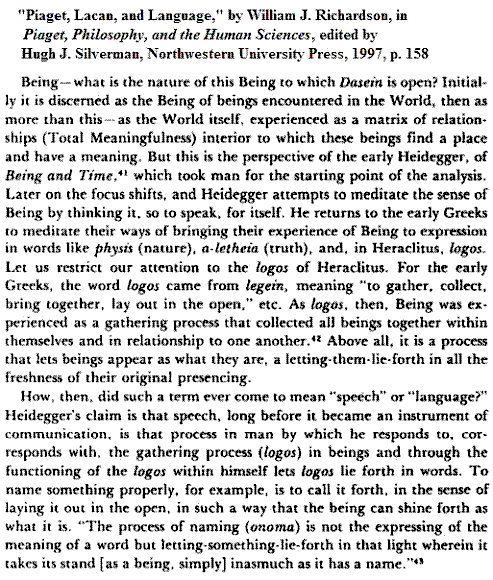
See as well hypokeimenon in this journal.
David Corfield on "Aesthetic Theory and Artistic Practice" —
"… British naturalism of the nineteenth century is seen to be
based on a theory of art whose origin lies in eighteenth century
philosophy. Collingwood believes this to be a false theory,
as first made clear artistically by Cezanne. Note also that
Collingwood should feel the need to depart from abstract
argument to include the case study.
Exercise: with minimal changes make the above true for
the philosophy of mathematics. Once done, we see how
we should expect to find a philosophy of mathematics
in each mathematician, even if it only functions implicitly.
See Philosophy as Normative or Descriptive.
Last revised on July 12, 2010 at 11:02:44."
See as well some philosophical remarks by the late
William J. Richardson, S.J., quoted here on July 12, 2010.
In memory of William J. Richardson, S.J., who reportedly
died at 97 on 10 December 2016…
This journal on that date —
The previous post quoted some dialogue from Victor Hugo's
novel about the French Revolution, Ninety-Three.
This suggests a look at the following non-fiction book:

Compare and contrast with the novel The Eight , by Katherine Neville,
about chess and the French Revolution.
Neville's birthday, April 4, plays a major role in her novel. The dies natalis
(in the Roman Catholic sense) of the above Birth of the Chess Queen
author, on the other hand, was reportedly November 20, 2019.
Following a link in this journal from November 20 leads to remarks
that might interest the subjects of an upcoming film, "The Two Popes."


Related material:
Heidegger and Aristotle: The Twofoldness of Being,
by Walter A. Brogan, (SUNY Press, 2005)—
Heidegger: Through Phenomenology to Thought,
by William J. Richardson, S.J., (Springer, 1974)—
Powered by WordPress